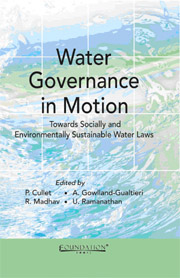Book contents
- Frontmatter
- Contents
- Acknowledgments
- Contributor Biographies
- Introduction
- I Water Law, Policy and Institutional Reforms in India
- II Ongoing Irrigation and Ground Water Reforms in India
- III Perspectives on Privatisation
- IV Environment and Human Rights
- V Comparative Perspectives on Reforms
- 16 Learning from Water Law Reform in Australia
- 17 Law and ‘Development’ Discourses About Water: Understanding Agency in Regime Changes
- 18 Marginal Remarks Concerning Water Policy Regimes; Governance, Rights, Justice, and Development: An Epilogue
- Bibliography
18 - Marginal Remarks Concerning Water Policy Regimes; Governance, Rights, Justice, and Development: An Epilogue
from V - Comparative Perspectives on Reforms
Published online by Cambridge University Press: 26 October 2011
- Frontmatter
- Contents
- Acknowledgments
- Contributor Biographies
- Introduction
- I Water Law, Policy and Institutional Reforms in India
- II Ongoing Irrigation and Ground Water Reforms in India
- III Perspectives on Privatisation
- IV Environment and Human Rights
- V Comparative Perspectives on Reforms
- 16 Learning from Water Law Reform in Australia
- 17 Law and ‘Development’ Discourses About Water: Understanding Agency in Regime Changes
- 18 Marginal Remarks Concerning Water Policy Regimes; Governance, Rights, Justice, and Development: An Epilogue
- Bibliography
Summary
The Editors of this volume (Philippe Cullet, Alix Gowlland- Gualtieri, Roopa Madhav, and Usha Ramanathan) deserve warm appreciation for assembling in this work a range of distinguished contributions concerning the nature and scope of ‘water law’ in national and international perspectives. Because I believe that nearly everything worth saying has been here well said, I tried to resist the request of Philippe Cullet and Usha Ramanathan to contribute an additional chapter. I failed; hence, this Epilogue which merely constitutes a cluster of remarks concerning the question of relation between theory, policy, law, and movement, the will to human rights, forms of ideological critique, and the affairs of justice.
Towards Understanding Water Policies: A Preliminary Excursus
‘Policy’ emerges as a ubiquitous notion, and a key category, and yet also as a disquieting sphere. One may (here following Radha D'Souza) deploy the difficult notion of ‘regimes’ in speaking about ‘water policy regimes’ (WPR). This requires some analytical unpacking. One may proceed to do at several levels of analysis such as the distinctions typically furnished by the purpose, intent, or the overall telos of water policy regimes often unhelpfully described in terms of the trichotomy – water for life, industry, and development, or proceed to perform a level-of-analysis task. In the latter perspective, one distinguishes among: (a) macro water policies provide a general approach to water governance (often expressed as WRM – water resource management- policies; as ‘water sector reform’ policy (WSRP); (b) meso water policies are those specifically concerned with a particular sector/vector of water management or governance or (c) micro-policies, primarily though in terms not so much of policy enunciation but rather as strategies of implementation at the ground or the local level.
- Type
- Chapter
- Information
- Water Governance in MotionTowards Socially and Environmentally Sustainable Water Laws, pp. 510 - 530Publisher: Foundation BooksPrint publication year: 2010

